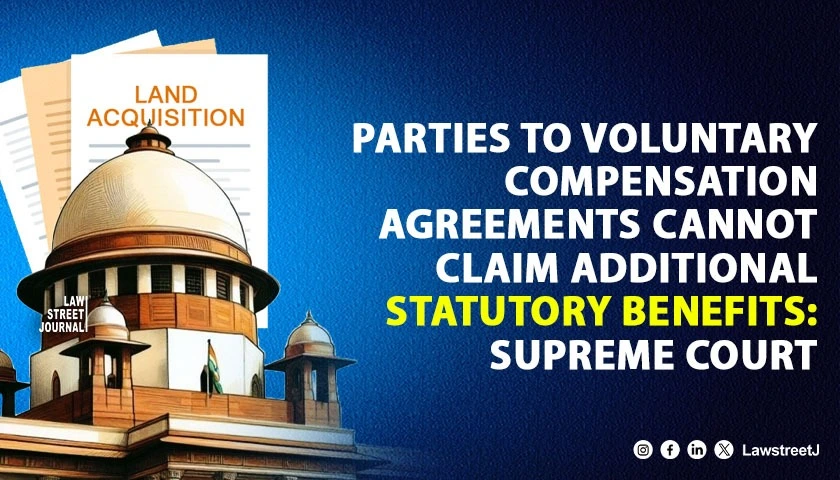New Delhi: The Supreme Court of India has delivered a landmark judgment affirming that parties who voluntarily enter into compensation agreements under land acquisition proceedings cannot subsequently claim additional statutory benefits, underscoring the sanctity of concluded contracts.
Justice M.M. Sundresh, writing for the Bench, made crucial observations on the finality of negotiated settlements under the Tamil Nadu Acquisition of Land for Industrial Purposes Act, 1997.
The Court addressed Civil Appeal arising out of SLP (C) Nos. 12770–83 of 2020 filed by the Government of Tamil Nadu against P.R. Jaganathan and others. Framing the issue, the Court stated: “The issue for consideration in these appeals is whether a party to a concluded contract, voluntarily and statutorily entered into, can seek further relief by taking refuge under the statutory provisions.”
Discussing the statutory framework for compensation determination, the Court observed: “Section 7 of the 1997 Act is an exhaustive provision dealing with the determination of the amount of compensation to be paid to the landowner or person interested. Sub-section (2) encourages and facilitates the determination of the amount payable through an agreement with the Government.”
Highlighting the significance of voluntary agreements, the Court stated:
“After an agreement is entered into, the terms and conditions mentioned therein, along with the amount duly arrived at, alone would govern the parties. In other words, the agreement becomes sacrosanct, terminating the umbilical cord connecting it to other provisions concerning the passing of the award under the 1997 Act.”
Regarding Section 12, the Court held:
“Section 12 of the 1997 Act has no application where an agreement has been entered into between the parties. A concluded contract under Section 7, voluntarily entered into, excludes itself from the purview of the Act thereafter.”
Examining the factual background, the Court noted that a meeting between the Special District Revenue Officer, officials of the AAI, and landowners on 06.03.2018 resulted in an agreement fixing compensation at ₹1500 per sq. ft. for residential land and ₹900 per sq. ft. for agricultural land. The Court observed that these rates substantially enhanced the prevailing guideline values and were fixed by consent.
The Court criticized the High Court’s contradictory reasoning:
“The High Court held that once consent was given and an agreement arrived at, it constituted a complete package and therefore claiming additional amounts such as solatium does not arise. However, it then proceeded to hold that the landowners were entitled to interest—a finding contrary to the very nature of a concluded contract.”
Reiterating the principle of contract finality, the Court held:
“Once there is a final agreement, all disputes with respect to determination of rent and interest stand subsumed within the contract. Any interpretation to the contrary would violate Section 7(2) and Section 7(4) of the 1997 Act.”
Invoking the doctrine of approbation and reprobation with reference to Union of India v. N. Murugesan, the Court stated:
“No party can be permitted to accept and reject the same thing. One cannot blow hot and cold, and the principle of election is inherent in the concept of approbate and reprobate.”
The Court also cited Ranveer Singh v. State of Uttar Pradesh to emphasize that where compensation is accepted without protest and with a stipulation not to claim further amounts, it is deemed to include all relevant components, including interest up to the date of the agreement.
Stressing judicial restraint in contractual matters, the Court remarked:
“The power under Article 226 is discretionary and extraordinary. Unless circumstances warrant, there shall not be interference in a concluded contract. By the impugned judgment, the High Court has rewritten the agreement.”
Concluding, the Court held:
“We have no hesitation in setting aside the impugned judgment to the aforesaid extent. Consequently, the appeals are allowed.”
The Court also emphasised that the agreement was neither induced by force nor fraud:
“There is no suppression of fact or element of deceit. The private respondents were initially inclined to accept the amount determined by way of a final agreement.”
Case Title: The Government of Tamil Nadu & Others vs. P.R. Jaganathan & Others (2025 INSC 1332)













